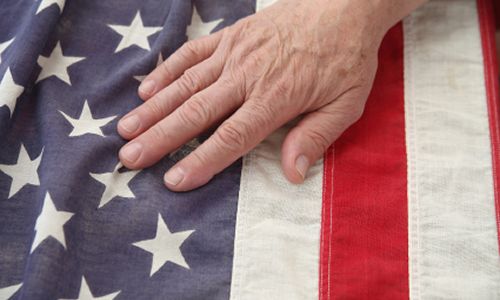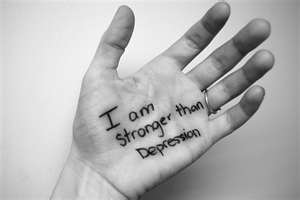People on Facebook and Twitter are honoring U.S. veterans with words of gratitude and awe. All well and good, but not nearly enough for the countless vets who suffer in silence.
Mood music:
[spotify:track:0dOg1ySSI7NkpAe89Zo0b9]
In so many ways, we continue to treat our veterans like shit. We let so many of them live on the streets, without proper shelter or medication for the mental illnesses they caught from watching comrades get ripped apart by shrapnel on the battlefield.
We look down at veterans every day as lazy, crazy, smelly vermin who prowl the streets scaring our children. We have no idea of what they’ve been through to get so scarred, and a lot of us don’t really care — even if we say we do.
Flashback: September, 2010:
I’m walking the streets of Brooklyn on a beautiful night, and a guy comes up to me. He has a hole in his head where his left eye used to be and burn scars up and down one arm.
I’m smoking a cigar, so he approaches me for a light. He tells me he was maimed in Afghanistan during military service and asks for some change so he can get a train to somewhere. He tells me he’s in New York looking for work and was stranded without money.
I give him the change from my pocket and then he’s gone.
Is he telling the truth? I have no idea, and I don’t really care. He just looked like a guy in pain who needed a few quarters to survive the next few hours, and that’s all that mattered at the time.
Flashback: Late April, 2011:
I’m on Facebook one afternoon and I see a friend commenting that he’s disappointed that some of his friends have decided to “like” a page that makes fun of a fellow known in Haverhill, Mass., as Crazy Mike.
In any city there’s a guy like “Crazy Mike.” The stereotype is usually a long beard, ratty clothes and the fellow is usually living on the street. He talks aloud to no one in particular and falls asleep on playground equipment. People like to laugh at him.
A lot of these so-called crazy guys are homeless vets whose luck ran out somewhere between the battlefield and the hard re-entry into society.
After a few seconds of thinking this through (admittedly, a few seconds is never enough time to really think things through), my temper reaches full boil and I pound out a blog post called “Liking The Crazy Mike of Haverhill Page is Sad and Stupid.”
Discussion follows online, with a big question being if Crazy Mike was in Vietnam and, as a result, sick on the streets with Post-Traumatic Stress Disorder. One reader insists he is indeed a veteran, and that other homeless people keep stealing his medication. Someone else says she knew the family fairly well, and that Mike is not a veteran. He’s simply a guy who has a serious mental illness.
To me, it doesn’t matter if he was in Vietnam or not. Instead, two realities have my mind spinning like a top on fire.
One is that a lot of people assume he is a veteran, but treat him like shit anyway.
Another thing is that there are a lot of homeless who ARE military veterans, and most days we don’t give them more than a few seconds of thought before we walk on by.
It’s almost as if we honor them on holidays to make ourselves feel better about being the assholes we often are.
I say this as a guy who is admittedly one of those assholes. I’ve made my share of fun of people like this, and in the rear-view mirror, looking back at my own struggle with mental illness, it makes me feel ashamed. Back when fear, anxiety and addiction had me by the balls, I used to walk or drive the other way when these guys approached. It makes me the last guy on Earth who would be fit to judge others for poking fun at someone less fortunate.
It’s not just the homeless vets who get shafted every day. It’s also the ones who have managed to stay off the streets but need special medical attention. Every day, the system set up to help them fails them instead. Sometimes the intent is good, but the message doesn’t get out to those who need to know.
Here’s an example, courtesy of my friend Magen Hughes, who once volunteered for the Compensated Work Therapy (CWT) group:
What they do is they provide vocational therapy, training, etc. to veterans who are not only homeless, but also those who suffer from addictions of various kinds as well as mental disorders.
The group isn’t really well known (or at least, that was my impression while I was at the VA Hospital), so a lot of the veterans who could benefit from the vocational therapy are left continuing down the path that they’ve always known, no matter how destructive it may be. Or they are shoved in one of the psychiatric wards or the nursing home.
That was probably the most heart-breaking part about volunteering, was seeing that there was a service that could help them out, but no one either knew or cared enough to really do them any good. I vaguely recall even being chastised once when bringing up CWT to a nurse as an idea for one of the patients.
They didn’t think that there was a group like that at the VA and I shouldn’t be worrying about “adult stuff like that.”
Veterans need our undivided attention, every day. A holiday here and there is not enough.
Maybe we can start doing better by not ridiculing the guys that have to sleep in our playgrounds and town commons.
I count myself among those who need to do better.
I’ve driven past these guys many times. I don’t go to memorial services on Veteran’s Day like I should. I certainly didn’t adequately appreciate my grandfather’s valor when he was alive.
We all have work to do.










